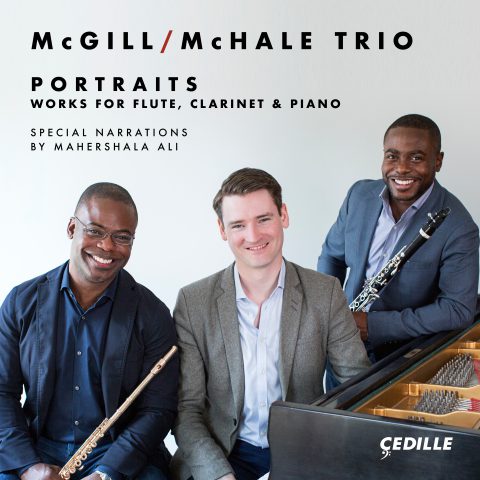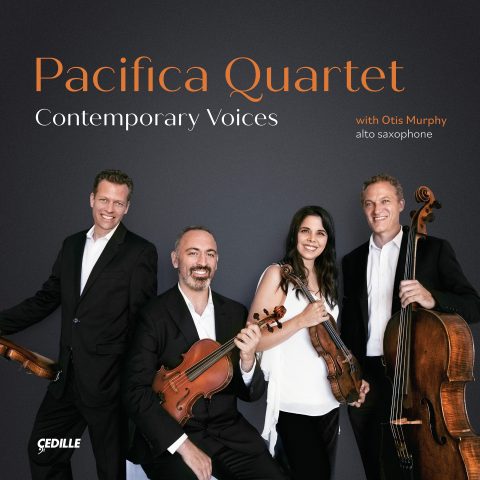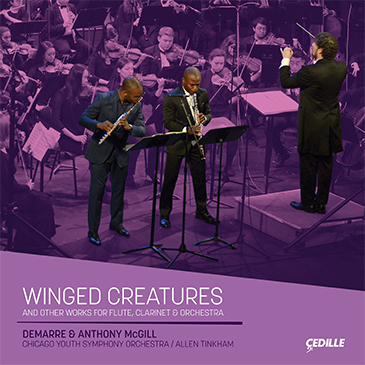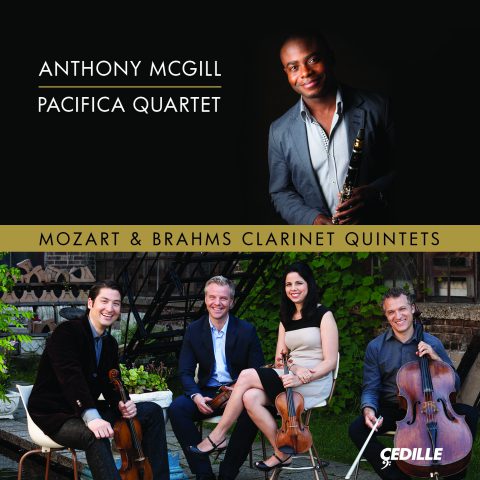| Subtotal | $18.00 |
|---|---|
| Tax | $1.85 |
| Total | $19.85 |
Store
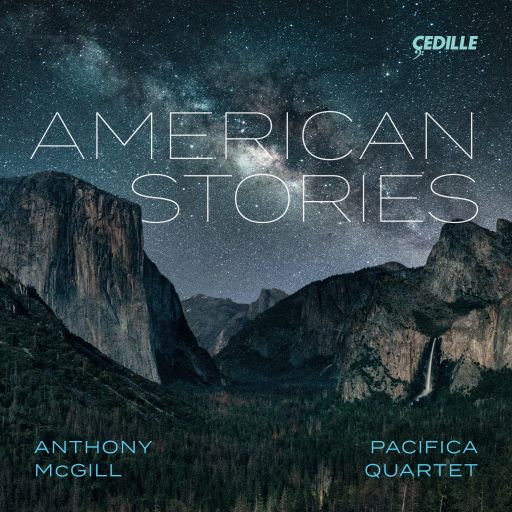
2024 Grammy nominee – Best Chamber Music/Small Ensemble Performance
Anthony McGill, New York Philharmonic principal clarinet and 2020 Avery Fisher Prize winner, and the multiple Grammy Award-winning Pacifica Quartet present an album illuminating experiences that have shaped America through works by Richard Danielpour, James Lee III, Ben Shirley (all three world-premiere recordings), and Valerie Coleman. McGill describes it as a project driven by the desire to “expand the capacity for art and music to change the world.”
Danielpour’s Four Angels pays tribute to the four young Black girls killed in the 1963 Birmingham, Alabama, church bombing and to civil rights advocates who refused to be intimidated by racial violence. Lee’s Quintet for Clarinet & String Quartet reflects on the Native American experience and echoes elements of Native music. Ben Shirley’s High Sierra Sonata, which inspired the album’s scenic cover art, evokes California’s Eastern Sierra Nevada mountains and the camaraderie and perseverance of runners in the region’s annual high-altitude marathon. Coleman’s Shotgun Houses celebrates the life of Muhammad Ali and the West Louisville, Kentucky, neighborhood where she and the legendary prizefighter were raised.
Clarinetist McGill and the Pacific Quartet’s previous collaboration on Cedille Records, Mozart & Brahms Clarinet Quintets, garnered widespread critical acclaim and continues to be a staple of classical radio programming. “The pure, gorgeous tone and expressive musicianship of the clarinetist Anthony McGill meshes with the talents of the excellent Pacifica Quartet for thoroughly enjoyable readings” (The New York Times).
McGill’s Cedille discography also includes 2021’s widely admired Here With You, with pianist Gloria Chien; Winged Creatures, with his brother, flutist Demarre McGill, and the Chicago Youth Symphony Orchestra conducted by Allen Tinkham; and Portraits – Works for Flute, Clarinet & Piano, with his brother Demarre and Irish pianist Michael McHale.
This is the Pacifica Quartet’s 13th Cedille Records album. Its Contemporary Voices, with works by Shulamit Ran, Jennifer Higdon, and Ellen Taaffe Zwilich (featuring renowned classical saxophonist Otis Murphy), won the 2021 Grammy Award for Best Chamber Music/Small Ensemble Performance. The Pacifica’s collaboration with superstar classical guitarist Sharon Isbin on Cedille’s Souvenirs of Spain & Italy was hailed as “another triumph for Ms. Isbin and a feather in the caps of the Pacifica Quartet” (New Music Buff).
Preview Excerpts
Richard Danielpour
Four Angels
James Lee III
Quintet for Clarinet & String Quartet
Benjamin J. Shirley
High Sierra Sonata
Valerie Coleman
Shotgun Houses
Artists
1: Anthony McGill; Pacifica Quartet
Program Notes
Download Album BookletFour Angels
Notes by Richard Danielpour
I composed Four Angels in April 2020 for Anthony McGill and the Catalyst Quartet on a commission by the Metropolitan Museum of Art in New York. The concert that was supposed to take place at the Met the following concert season was postponed due to the COVID-19 pandemic. A live-streamed online performance occurred later in 2021.
The work was composed to bring a deeper awareness in America of why Black lives do indeed matter. The title refers to four little girls who were murdered in 1963 in a church in Birmingham Alabama, victims of a hate crime. This event in our history, one of many blemishes that stain the American historical landscape, is a reminder of how destructive racism can be, whether it is covert or overt. It behooves us, especially now, at a time when racism is once again showing its face more openly, to remind ourselves of the insidious and malevolent nature of such behavior and such crimes. These four little girls, who were martyred, serve as a symbol for the hope and innocence that many years ago in America was suffocated. The music that I wrote 57 years later is a memorial to their memory and to the memory of those who, in the past, refused to be daunted by such deplorable acts. This music also stands as a small testament to the choice for a better path, one consisting of the compassion and understanding that we must have for one another. And although neither neo-Nazis, nor Proud Boys, nor members of the alt-right will likely comprehend what is written in these paragraphs, this music, and these words are composed for those who are willing to hear and understand.
Quintet for Clarinet and String Quartet
Notes by James Lee III
Quintet for Clarinet & String Quartet is a four-movement work inspired by historical aspects of indigenous Americans. The first movement, Forgotten Emblems, uses what I call an “inverted shofar theme” that can be heard at the beginning of Nathaniel Dett’s “The Ordering of Moses” and William Dawson’s “Negro Folk Symphony.” This movement also refers to various paintings of “An Emblem of America” from the 18th century. There are also many moments when I try to imitate an Indian Pow Wow. I named the second movement Awashoha, which is a Choctaw word that means “play somewhere.” This serves as the scherzo movement. Movement three serves as a kind of lament and references the reclassification of many indigenous people and their removal to other regions of the country. Then, finally, movement four is a short dance celebration of the lives represented in the various paintings of “An Emblem of America.”
High Sierra Sonata
Notes by Ben Shirley
In the summer of 2019, I was invited by a friend, Ryan Navales, to join him in serving as a volunteer at an aid station on the course of the Bishop High Sierra Ultras ultra-marathon. It marked my second trip to the Owens Valley, to visit my friend, who I’d met while we were both beginning the process of recovering from drug and alcohol addiction, while living at a homeless shelter in Los Angeles’ notorious Skid Row.
Way up in the Eastern Sierras, I soon learned that the weather, much like life, can change on a dime. As the mountains wake up, it is clear, cool, and sparkling with life. But within minutes, it is sleeting, freezing, howling, and ultimately covered in snow. The sun returns, and the rain returns, and on it went, before relative calm set in at the end of our 12-hour shift. Every season came and went through the course of a single day, which couldn’t help but remind me of the seasons of life, and in some cases the seasons of emotions we all go through, in a day, a week, a month, or a year. But regardless of the circumstances beyond my control there in the Eastern Sierras, the majestic beauty, the camaraderie amongst volunteers, the perseverance of the runners, and a decade-long friendship rooted in a shared experience remained as rock solid as the mountains we stood on.
Shotgun Houses
Notes by Valerie Coleman
Shotgun Houses is the first of three installments that celebrate the life of Muhammad Ali, a man who carried the pride of Louisville with him everywhere throughout his career. The title refers to the architectural landscape of his childhood community of West Louisville, which was once considered an indicator of poverty, but has since developed a historical nostalgia. In the first installment, I took a personal look at the young man, Cassius Clay, with the intention of introducing West Louisville, a community in which Ali and I were raised.
The first movement, ShotGun Houses, is a sketch of the neighborhoods of West Louisville in the 1950s period. Inspiration for the movement came from observing photos and tracing the path to get to Ali’s childhood home on Grand Ave. from my own childhood home just blocks away.
With a down-home wail, the beginning is a nod to Southern life and the view of shotgun houses, all lined up in a row. Soon after, the music shifts and the clarinetist’s upper register is prominently featured, symbolizing the bold personalities that all West Louisville children learn early on within their interactions: to verbally boast and tease one another as a part of playing in the streets. This was a time when the area was a thriving suburb, filled with a generation of people who, in large, embraced a determined responsibility towards their community. The rhythmic groove is a determined stomp, played with momentum within the strings, while the clarinetist answers within a declarative ricochet. ShotGun Houses ends gently with a dark realization of blight that the neighborhood has experienced in the present day.
Ali’s home on Grand Avenue titles the second movement, and the music is a simple ballad to his mother. In my research, every photo I found of Ali with his mother shows a kiss or embrace, and it is clear to see the pure love from that innocent child that remained with the champion throughout his life. The clarinet is sweet in sound here, as Ali wanted to give his mother a better life than what Grand Avenue could provide.
Rome 1960 is the final movement of the first installment, and appropriately so, as the result of the 1960 Olympics was truly the launch into Ali’s professional career.
It begins with a young Cassius Clay, Jr., training on a speed bag (the balloon-like bag that hangs upside down) as shown through the rapid repetitive rhythm between cello and viola. The music also reflects the imagery of a young Clay jogging through the West End of Louisville to start his daily training every morning before sunrise. The clarinet begins to season the rhythm with a bubbling of musical commentary to reflect Ali’s own prose during workout sessions when the news cameras came to visit. The first section ends with a short cadenza, depicting Ali’s first airplane flight overseas into Rome.
With the ringing of the bell (as depicted by the clarinet), what follows is a mini-musical documentary of the gold medal match between Ali and the reigning European champion, complete with hits, blows (orchestrated through a combination of string pizzicati and clarinet shrieks), and finessed defensive movements. In the first round, Zbigniew Pietrzykowski takes the lead. In the second round, they are evenly matched; the clarinet and cello end the round in a sustained dissonance to depict two boxers in a clinching (embraced) position before being broken up by the referee and the match bell. At this point, Ali quickly reflects on what needs to be done and, within the Meno mosso section of sobering and slow melody, realizes that the very last round should leave no doubt that he is the Olympic champion. As the “bell” rings one final time, a rejuvenated and determined Ali dances in the ring with a recapitulation of the opening material, reminding the listener of humanity’s determination, manifested through Ali’s greatness.
This is a work that I dedicate to my neighborhood, Ali’s neighborhood of West Louisville. May his legacy remind us of the greatness that we are all capable of achieving.
Album Details
PRODUCER
James Ginsburg
ENGINEER
Bill Maylone
RECORDED
September 8–10, 2021, Reva and David Logan Center for the Arts at the University of Chicago
GRAPHIC DESIGN
Bark Design
PUBLISHERS
Four Angels © 2020 Lean Cat Music (BMI)
Quintet © 2018 Subito Music Publishing (ASCAP)
High Sierra Sonata © 2020
benjamin j shirley music (BMI)
Shotgun Houses © 2018 V Coleman Music
PHOTOS
Cover: ferrantraite, iStockPage 4–5: © 2021
Eric Rudd Photography
Page 7: Clay Banks, Unsplash
Page 13: Emmy Gaddy, Unsplash
CDR 90000 216
